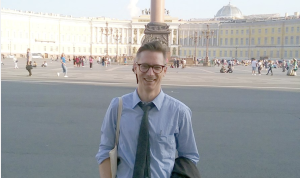Presented By: Lieberthal-Rogel Center for Chinese Studies
LRCCS Noon Lecture Series | Making a Buddhist State: Productivity as a Political Value in Early Modern Tibet
Ian MacCormack, Khyentse Lecturer in Buddhist Studies, Hebrew University of Jerusalem

If you would like to attend via Zoom, please register at https://myumi.ch/m72AZ
In this talk, Dr. MacCormack will share some examples from his research on late seventeenth-century Tibet, in the interest of broaching more abstract questions about the values and goals of political rule in this era. His aim is to explore how the voluminous texts and magisterial works that issued from Tibet’s political center might illuminate broader sociocultural trends in early modern Tibet. He will suggest that one of the defining features of political action in this era was the emphasis placed on material and intellectual productivity. This emphasis resonated with core ideals of political rule that found articulation in Buddhist cosmological terms. Situating Tibetan texts and works in this way may give us purchase on the larger question of just what it means to speak of this political project as a “Buddhist state.”
Ian MacCormack is the Khyentse Lecturer in Buddhist Studies at the Hebrew University of Jerusalem, where he teaches courses on religion and Asian studies. His research focuses on Tibetan intellectual and cultural history, especially intersections of religion and politics.
In this talk, Dr. MacCormack will share some examples from his research on late seventeenth-century Tibet, in the interest of broaching more abstract questions about the values and goals of political rule in this era. His aim is to explore how the voluminous texts and magisterial works that issued from Tibet’s political center might illuminate broader sociocultural trends in early modern Tibet. He will suggest that one of the defining features of political action in this era was the emphasis placed on material and intellectual productivity. This emphasis resonated with core ideals of political rule that found articulation in Buddhist cosmological terms. Situating Tibetan texts and works in this way may give us purchase on the larger question of just what it means to speak of this political project as a “Buddhist state.”
Ian MacCormack is the Khyentse Lecturer in Buddhist Studies at the Hebrew University of Jerusalem, where he teaches courses on religion and Asian studies. His research focuses on Tibetan intellectual and cultural history, especially intersections of religion and politics.